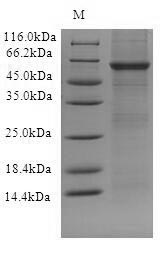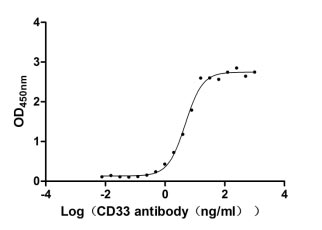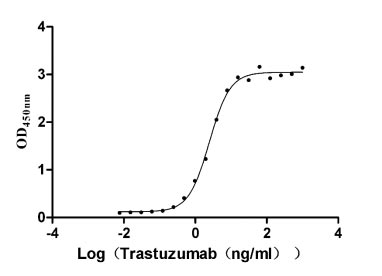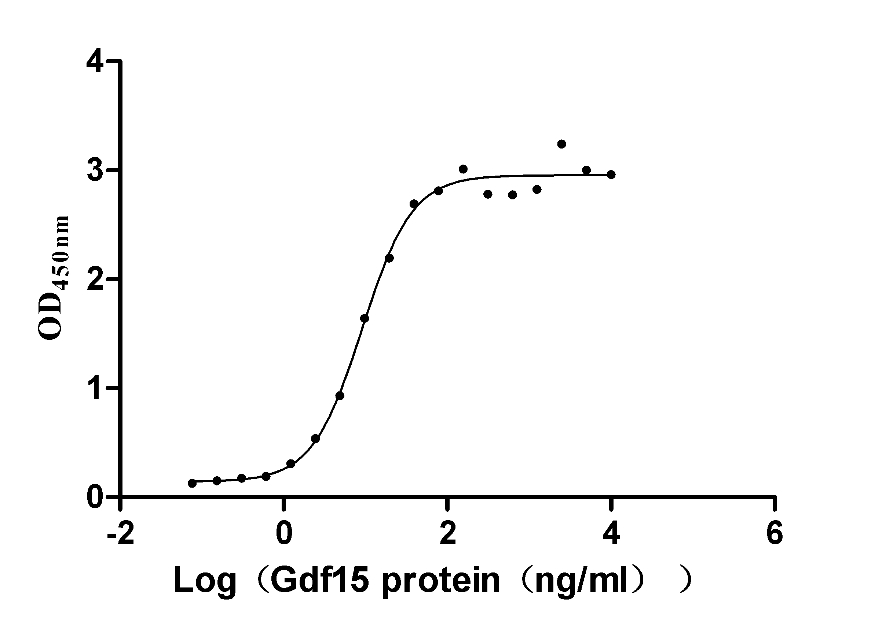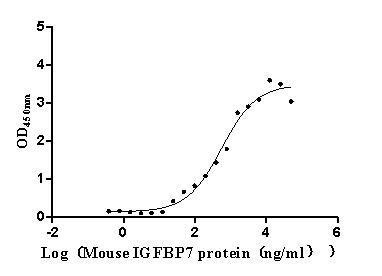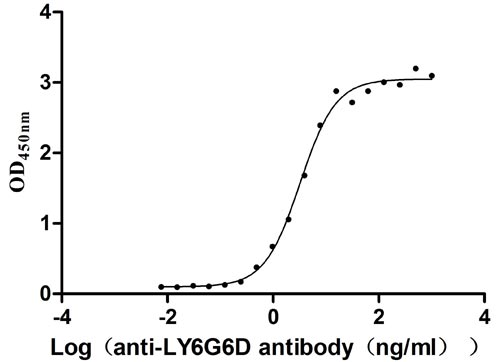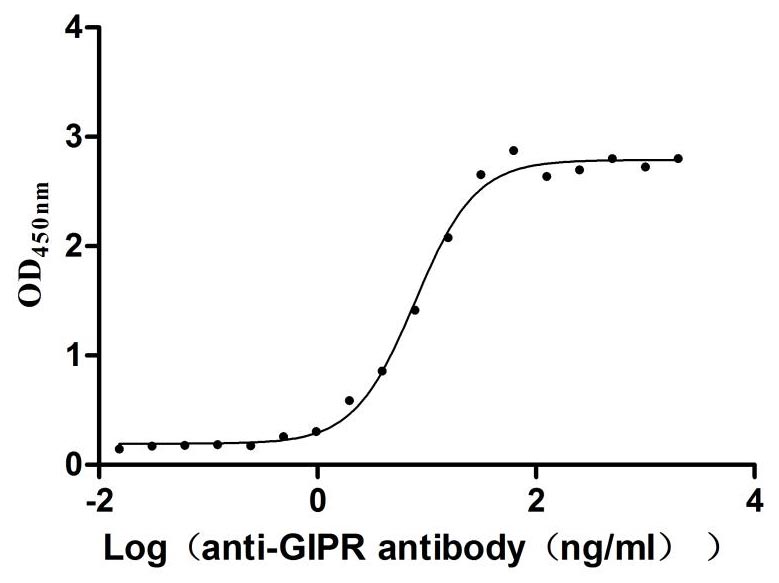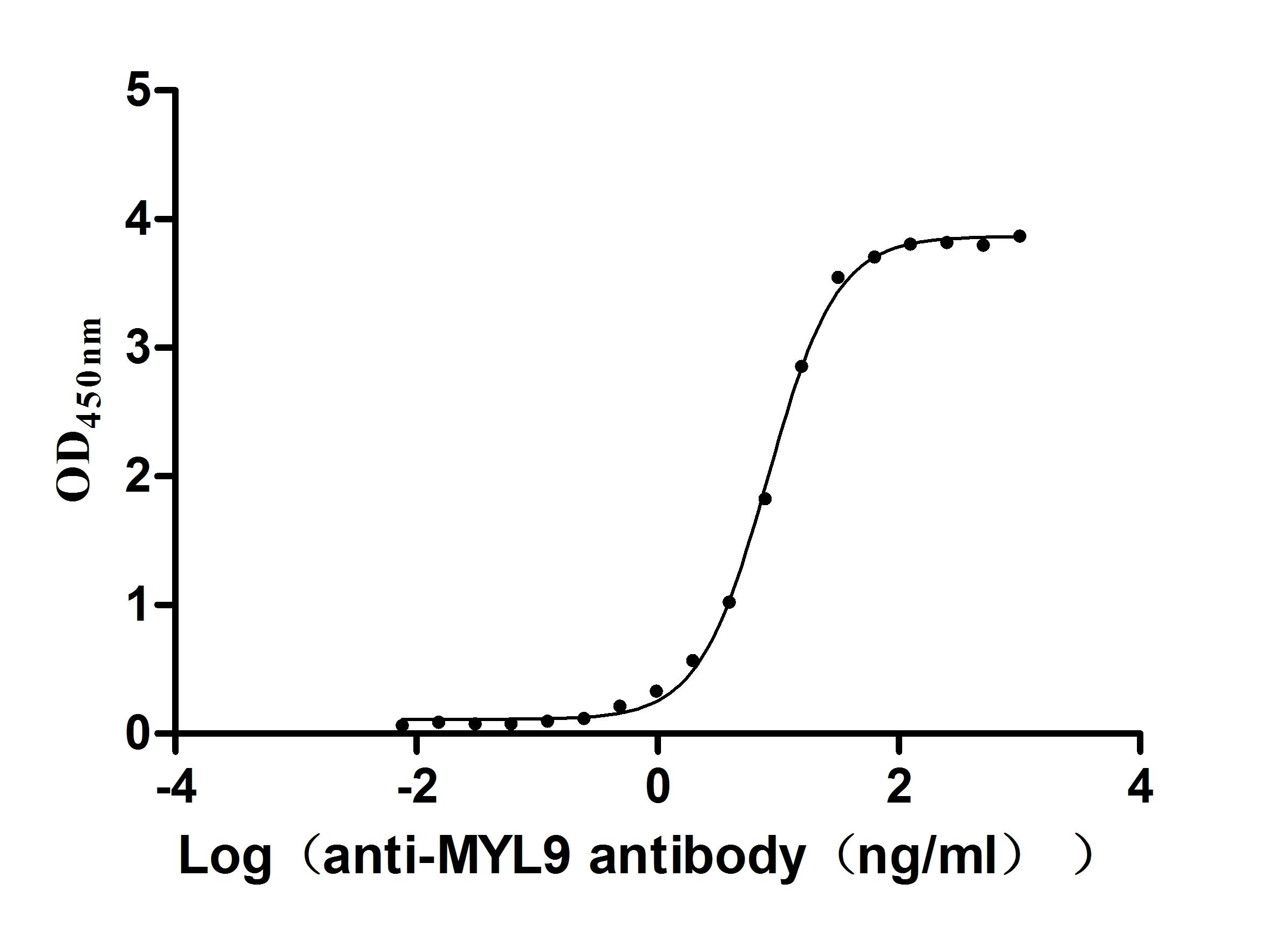Recombinant Human Toll-like receptor 10 (TLR10), partial
-
货号:CSB-CF023600HU
-
规格:¥5028
-
图片:
-
其他:
产品详情
-
纯度:Greater than 90% as determined by SDS-PAGE.
-
基因名:
-
Uniprot No.:
-
别名:TLR10; UNQ315/PRO358; Toll-like receptor 10; CD antigen CD290
-
种属:Homo sapiens(Human)
-
蛋白长度:Partial
-
来源:in vitro E.coli expression system
-
分子量:68.1kDa
-
表达区域:20-576aa
-
氨基酸序列DAPELPEERELMTNCSNMSLRKVPADLTPATTTLDLSYNLLFQLQSSDFHSVSKLRVLILCHNRIQQLDLKTFEFNKELRYLDLSNNRLKSVTWYLLAGLRYLDLSFNDFDTMPICEEAGNMSHLEILGLSGAKIQKSDFQKIAHLHLNTVFLGFRTLPHYEEGSLPILNTTKLHIVLPMDTNFWVLLRDGIKTSKILEMTNIDGKSQFVSYEMQRNLSLENAKTSVLLLNKVDLLWDDLFLILQFVWHTSVEHFQIRNVTFGGKAYLDHNSFDYSNTVMRTIKLEHVHFRVFYIQQDKIYLLLTKMDIENLTISNAQMPHMLFPNYPTKFQYLNFANNILTDELFKRTIQLPHLKTLILNGNKLETLSLVSCFANNTPLEHLDLSQNLLQHKNDENCSWPETVVNMNLSYNKLSDSVFRCLPKSIQILDLNNNQIQTVPKETIHLMALRELNIAFNFLTDLPGCSHFSRLSVLNIEMNFILSPSLDFVQSCQEVKTLNAGRNPFRCTCELKNFIQLETYSEVMMVGWSDSYTCEYPLNLRGTRLKDVHLHELSCNT
Note: The complete sequence including tag sequence, target protein sequence and linker sequence could be provided upon request. -
蛋白标签:N-terminal 10xHis-tagged
-
产品提供形式:Liquid or Lyophilized powder
Note: We will preferentially ship the format that we have in stock, however, if you have any special requirement for the format, please remark your requirement when placing the order, we will prepare according to your demand. -
缓冲液:Lyophilized from Tris/PBS-based buffer, 6% Trehalose, pH 8.0
-
储存条件:Store at -20°C/-80°C upon receipt, aliquoting is necessary for mutiple use. Avoid repeated freeze-thaw cycles.
-
保质期:The shelf life is related to many factors, storage state, buffer ingredients, storage temperature and the stability of the protein itself.
Generally, the shelf life of liquid form is 6 months at -20°C/-80°C. The shelf life of lyophilized form is 12 months at -20°C/-80°C. -
货期:Basically, we can dispatch the products out in 1-3 working days after receiving your orders. Delivery time may differ from different purchasing way or location, please kindly consult your local distributors for specific delivery time.Note: All of our proteins are default shipped with normal blue ice packs, if you request to ship with dry ice, please communicate with us in advance and extra fees will be charged.
-
注意事项:Repeated freezing and thawing is not recommended. Store working aliquots at 4°C for up to one week.
-
Datasheet & COA:Please contact us to get it.
相关产品
靶点详情
-
功能:Participates in the innate immune response to microbial agents. Acts via MYD88 and TRAF6, leading to NF-kappa-B activation, cytokine secretion and the inflammatory response.
-
基因功能参考文献:
- polymorphism in the TLR10 gene seems to increase the risk of post-bronchiolitis asthma in preschool-aged children PMID: 28592890
- rs4129009 polymorphism increased the risk of persistent asthma continuing from five to seven years of age until 11-13 years of age and increased the risk of needing inhaled corticosteroids at 11-13 years of age PMID: 28692144
- The TLR10 992AA genotype might increase and TLR10 720CC genotype might decrease susceptibility to pathogenesis of Crimean Congo hemorrhagic fever (CCHF) disease. TLR 10 polymorphisms may be also an important biomarker for CCHF susceptibility and fatality rate. PMID: 28843003
- Our results indicate that the presence of TLR10 rs10004195, A/T heterozygous, and T/T homozygous genotypes is associated with type 1, 2, and 3 whereas that of the A/A homozygous genotype is associated with type 4 and 5 of gastric mucosal patterns. This suggests that the A/A homozygous genotype contributes to severe inflammation in H. pylori-associated gastritis in Thai patients. PMID: 28699598
- data show increased TLR10 gene/protein expression in the adipose tissue in obesity/type-2 diabetes (T2D) which relates directly with BMI; data also show that ROS-mediated oxidative stress could induce expression of TLR10 in monocytic cells through the mechanism that involves NF-kappaB and MAPK signaling pathways and the ER stress response PMID: 29428931
- A TLR10 allelic variant, I473T, has impaired NFkB inhibitory activity and is highly associated with disease severity and low response to infliximab in patients with rheumatoid arthritis PMID: 27716427
- The data demonstrate that TLR10 is a novel regulator of innate immune responses and of the differentiation of primary human monocytes into effective dendritic cells. PMID: 28235773
- these results demonstrate that TLR10 functions as a broad negative regulator of TLR signaling PMID: 27022193
- Our results demonstrate that TLR10 has a functional role within the B cell lineage that is distinct from that of other TLR family members PMID: 27956526
- Study concludes that genetic variation in the TLR10-TLR1-TLR6 gene cluster mediates responsiveness to organic dust, but indicates different signaling pathways for IL-6 and TNF-alpha. These studies provide new insight into the role of the TLR10-TLR1-TLR6 gene cluster and the innate immune response to organic dust. PMID: 28123183
- Our results suggest that TLR10 is involved in the recognition of FSL-1, LPS, and flagellin and TLR-ligand-induced expression of TNF-alpha does not depend on TLR10. PMID: 27258267
- Data indicate that polymorphisms in toll like receptor 10 (TLR10) are not associated with chronic Q fever. PMID: 26364993
- Study annotated variants at 4p14 as expression quantitative trait loci (eQTL) associated with TLR6/10 and FAM114A1; findings suggest that 4p14 polymorphisms are linked to host immune response to H. pylori infection but not to its acquisition. PMID: 26312625
- concluded that TLR-1 rs4833095 and TLR10 rs10004195 confer susceptibility to development of gastroduodenal disease, especially GC in H.pylori disease PMID: 26559190
- genetic variants in TLR10 are associated with protection against complicated skin and skin structure infections PMID: 25895985
- TLR1 rs4833095 and TLR10 rs10004195 may play crucial roles in H. pylori susceptibility and gastric pathogenesis. PMID: 25687912
- Our results suggest that TLR10 polymorphisms may contribute to the pathogenesis of autoimmune thyroid diseases. PMID: 25295614
- single nucleotide polymorphism (SNP) in TLR10 (rs11096957) is associated with risk for Tuberculosis PMID: 25857634
- Genetic variation rs5743565 in TLR1 might be associated with the decreased susceptibility to Graves disease, whlie polymorphisms in TLR6 and TLR10 did not reach the statistical significance. PMID: 25028161
- The correlation between TLR1, TLR6, and TLR10 polymorphisms and the development of atopic dermatitis in the Republic of Bashkortostan has been found. PMID: 25850295
- The results suggest roles for TLR3, TLR10, PLAT (n=2), VEGFA and DENND1B in susceptibility to chronic cavitary pulmonary aspergillosis. PMID: 24712925
- TLR10 is a modulatory pattern-recognition receptor with mainly inhibitory properties PMID: 25288745
- Toll-like receptor 10 is involved in induction of innate immune responses to influenza virus infection. PMID: 24567377
- CCL20, CCL1, & IL-8 were reduced following TKR10 knockdown. TLR10 silencing increased viability of L. monocytogenes in both HT-29 & THP-1 cells. TLR10 senses pathogenic infection in both intestinal epithelium & macrophages. PMID: 24198280
- data indicate novel roles for TLR10 in sensing pathogenic infection in both the epithelium and macrophages and have identified L. monocytogenes as a source of ligand for the orphan receptor TLR10. PMID: 24198280
- promotes trophoblast apoptosis triggered by gram-positive bacterial components PMID: 23279063
- The study shows that genetic variation within the TLR10/1/6 locus is the major common genetic factor explaining interindividual variation in TLR1/2-mediated cytokine responses. PMID: 23151486
- Allelic variants in TLR10 gene is associated with bilateral affectation and clinical course of Meniere's disease. PMID: 23370977
- genetic association study in a population in Republic of Korea: Data suggest that SNP in TLR10 (rs11466653; T allele, Met326Thr) is associated with development of papillary thyroid carcinoma with small tumor size (<1 cm). PMID: 23124277
- Statistical differences have been found in TLR10 (rs4129009) gene between low and high tumor infiltration stage. PMID: 22504414
- The results showed that the genetic markers in TLR1, TLR4, TLR5 TLR6, and TLR10 were associated with the occurrence of acute Graft-versus-host disease following hematopoietic stem cell transplantation PMID: 22703024
- genetic variation in TLR10 plays a role in interindividual differences in CD susceptibility and clinical outcome. PMID: 22342453
- No significant differences are found in the TLR3 and TLR10 genotypes or allele distribution between rheumatoid arthritis patients and control individuals. PMID: 20422193
- absence of the common haplotype in the TLR10-TLR1-TLR6 gene cluster increases the risk of developing chronic disease in patients already affected by sarcoidosis. PMID: 22150367
- Case-control analysis showed that the TLR10 gene single nucleotide polymorphism rs10004195 was associated with immunoglobulin A nephropathy (IgAN) in Korean children. Results suggest that TLR10 gene may be associated with susceptibility to IgAN. PMID: 20953797
- Pam(3)CSK(4) is the ligand for the hTLR10/2 complex and PamCysPamSK4 activates hTLR10/1 hetero and hTLR10 homodimer. PMID: 20877634
- genetic polymorphism association with allergic rhinitis in asthma in a Chinese population PMID: 20815312
- Analysis of chimeric receptors containing the TLR10 extracellular recognition domain indicates that human TLR10 cooperates with TLR2 in sensing of microbes and fungi but possesses a signaling function distinct from that of other TLR2 subfamily members. PMID: 20348427
- in reproductive tract, expression is restricted to Fallopian tube PMID: 19406482
- IL-13/IL-4 and TLR-10 might be involved in the genetics of preterm births. PMID: 19332998
- TLR10 is a potential asthma candidate gene. TLR10 genetic variation contributes to asthma risk. PMID: 15201134
- Unlike TLR1 and TLR6, TLR10 is expressed in a highly restricted fashion as a highly N-glycosylated protein, which is detected in B cell lines, B cells from peripheral blood, and plasmacytoid dendritic cells from tonsil. PMID: 15728506
- The observed multiple associated SNPs at the TLR6-TLR1-TLR10 gene cluster were dependent and suggest the presence of a founder prostate cancer risk variant on this haplotype background. PMID: 15812078
- We genotyped 19 common (>5%) haplotype-tagging SNPs chosen from the SNPs discovered in a resequencing study spanning TLR6, TLR1, and TLR10 to test for the association between sequence variants cluster and prostate cancer. PMID: 17932345
- The TLR10 structure is in good agreement with available biochemical data on TLR receptors and is likely to provide a good model for the physiological dimer. PMID: 18332149
- common haplotype in the TLR10-TLR1-TLR6 gene cluster influences prostate cancer risk and clearly supports the need for further investigation of TLR genes in other populations PMID: 18752252
显示更多
收起更多
-
亚细胞定位:Membrane; Single-pass type I membrane protein.
-
蛋白家族:Toll-like receptor family
-
组织特异性:Highly expressed in spleen, lymph node, thymus, tonsil and at lower levels in lung. Highly expressed in promyelocytic HL-60 cells and in B-cell lines.
-
数据库链接:
HGNC: 15634
OMIM: 606270
KEGG: hsa:81793
STRING: 9606.ENSP00000308925
UniGene: Hs.120551
Most popular with customers
-
Recombinant Human Myeloid cell surface antigen CD33 (CD33), partial (Active)
Express system: Mammalian cell
Species: Homo sapiens (Human)
-
Recombinant Human Receptor tyrosine-protein kinase erbB-2 (ERBB2), partial (Active)
Express system: Mammalian cell
Species: Homo sapiens (Human)
-
Recombinant Mouse GDNF family receptor alpha-like (Gfral), partial (Active)
Express system: Mammalian cell
Species: Mus musculus (Mouse)
-
Recombinant Mouse Complement component C1q receptor (Cd93), partial (Active)
Express system: Mammalian cell
Species: Mus musculus (Mouse)
-
Recombinant Human Lymphocyte antigen 6 complex locus protein G6d (LY6G6D) (Active)
Express system: Yeast
Species: Homo sapiens (Human)
-
Recombinant Rat Gastric inhibitory polypeptide receptor (Gipr), partial (Active)
Express system: Mammalian cell
Species: Rattus norvegicus (Rat)
-
Recombinant Human Myosin regulatory light chain 12B(MYL12B) (Active)
Express system: E.coli
Species: Homo sapiens (Human)
-
Recombinant Human Dipeptidase 3(DPEP3), partial (Active)
Express system: Mammalian cell
Species: Homo sapiens (Human)

